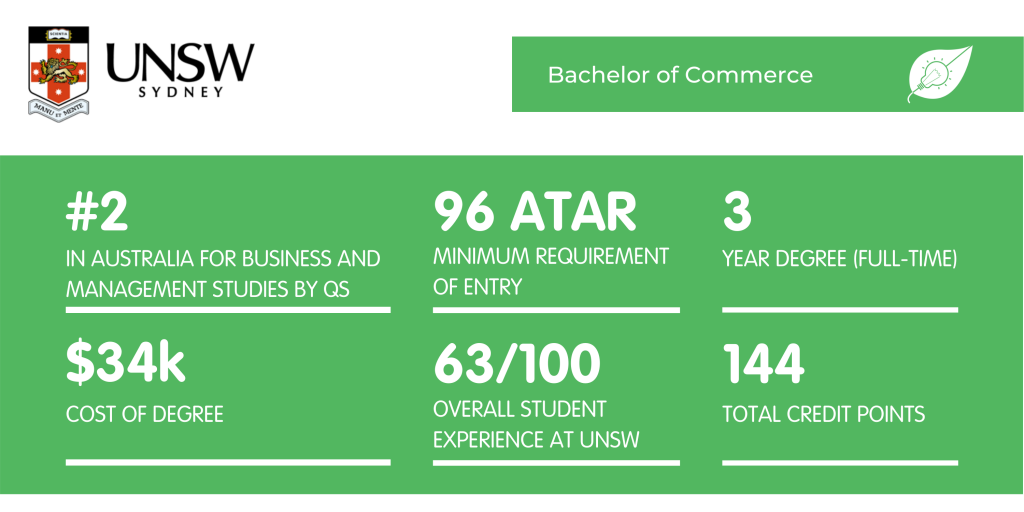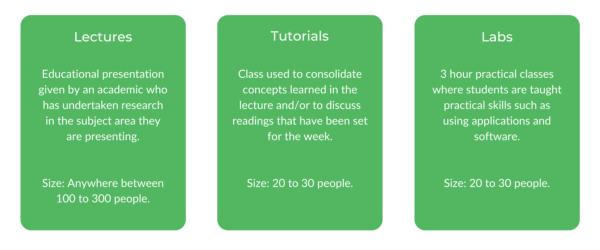Considering a Bachelor of Commerce at UNSW?
Then you’ve come to the right place! We’ve put this guide together to give you everything you need to know about this degree, from career paths to culture—we’ve got you covered.
Let’s get started!
What is a Bachelor of Commerce at UNSW?
Core Units and Majors
How to Get into a Bachelor of Commerce at UNSW
What’s the Teaching Format?
What’s the Faculty and Culture Like?
What is a Bachelor of Commerce at UNSW?
A Bachelor of Commerce at UNSW is the study of business that combines practice and theory to equip students with the skills to excel in the industry. Commerce degrees are broad, and designed to give students a variety of business skills such as accounting, management, economics and more, making it a very versatile degree with lots of majors and future career paths!
If you’re not sure what you want to do after high school, a Bachelor of Commerce offers a wide range of disciplines that is sure to help you figure it out! The degree can also be taken alongside another degree, such as a Bachelor of Arts or Engineering.
Honours
UNSW offers an Honours year for Commerce, which requires a minimum of 70 WAM (Weighted Average Mark) in your degree in order to be eligible to apply. So if you want to develop your research skills further and craft a thoroughly investigated thesis by the end of your studies, work hard throughout your degree to be accepted into Honours!
Career Paths
Depending on what you choose to major in (we’ll get into that soon!), a degree in Commerce sets you on the path for a job in the business industry. However, the growth in the technology industry has changed the nature of the corporate world, so rather than climbing the traditional ‘corporate ladder’, per se, you’ll likely see yourself in a range of different roles across the span of your career.
Here’s an idea of some careers that a Bachelor of Commerce at UNSW could set you on:
-
- Accountant/Auditor
- Consultant
- Cyber Security Analyst
- Data Analyst
- Economist
- Financial Advisor
- Human Resource Manager
- Investment Banker
- Marketing Manager
- Tax Advisor/Officer
Employers look for professional experience more than they do your academic performance at university, and this is especially true for Commerce graduates.
Almost all students studying Commerce will take an internship or relevant part time job in the business industry alongside their degree. Some even delay their study to work full-time for a while before returning to finish their degree.
Recruiters will look for skills gained from your professional learning experience and because of the competitive job market, a Commerce degree alone may not get you the job you want.
Core Units and Majors
What are the Core Units?
All students studying a Bachelor of Commerce at UNSW have to complete 8 core units. These include:
-
- Business Decision Making
- Evidence-Based Problem Solving
- Collaboration and Innovation in Business
- Financial Management
- Global Business Environments
- Organisational Resources
- Value Creation
- Data, Insights and Decisions
Here’s a little peek at a few of the core units you could be taking by studying Commerce:
| Core Unit | Description |
|---|---|
| Business Decision Making | The first course all business students take, where they learn about economics, corporate responsibility and legal principles to understand what leaders need to consider and what actions they might take when making business decisions. |
| Evidence-Based Problem Solving | Introduces students to the fundamentals of a deliberate and structured approach to problem solving, balancing analysis and judgement, to avoid the common pitfalls of problem solving in organisations. |
| Collaboration and Innovation in Business | Presents students with creative thinking tools, taking a hands-on approach to focus on the big challenges businesses are facing in the 21st century. |
These first-year level units will equip you with problem solving, communication, management and interpersonal skills essential to working in the business industry. From there, your units will depend on the major(s) you choose.
What are the Majors?
UNSW offers 13 majors in a Bachelor of Commerce, and you can choose to do a ‘double major’ if you study Commerce as a single degree.
Some popular majors are:
-
- Accounting
- Finance
- Information Systems
- Marketing
- Taxation
Have a look here for all the core units, majors and their descriptions!
Are there built-in internship programs?
Yes! UNSW offers an Industry Experience Program (COMM2222) that you can undertake as part of the degree.
While the university secures internship spots with a range of companies, you still have to undergo a multi-step application and interview process. This can be competitive, but less so as the company chooses from a narrower pool of UNSW candidates.
How to Get into a Bachelor of Commerce at UNSW
A Bachelor of Commerce at UNSW does not require any pre-requisite HSC subjects. However, Mathematics is considered ‘assumed knowledge’ by the university, so we wouldn’t recommend skipping out on that!
An ATAR of 96 will guarantee you entry into the course but if you don’t achieve this ATAR, Adjustment Factors (also known as Bonus Points) can boost your selection rank. There are also alternative pathways into the degree, such as the UNSW ACCESS Scheme!
Scholarships
UNSW offers plenty of scholarships that are specific to a range of degrees! You can find out more here!
A Bachelor of Commerce (Co-op) is a scholarship program that provides financial assistance and secured internships and placements with industry sponsors integrated into the degree.
What’s the Teaching Format?
At UNSW, all courses are taught under a trimester format. This means that there are three 10-week terms across the year, with 2-week breaks excluding the summer holidays. For a Bachelor of Commerce, this means increased flexibility with how you tailor your degree!
Overloading and studying 3 courses per term (resulting in nine units per year, as opposed to the usual eight) means that you can potentially fast-track your degree and finish before the full three years!
Class Structure
Commerce at UNSW is taught through lectures, tutorials and the occasional lab.
Lectures
Lectures for Commerce are rarely compulsory and go for 2 hours. They teach course content and will usually have anywhere from 100 to 300 students.
Generally, students tend to watch recordings or learn from lecture slides rather than attend the live lecture, so you might find that despite the large cohort, only a few people are in the lecture hall! You’ve got the freedom to learn independently or digest information amongst your peers in a lecture theatre – it all really depends on the way you prefer to study.
Tutorials
The 1 hour tutorial is where most of the course content is learned through solving questions and discussing course content with 30 or so other peers. Most courses will have homework sets each week which will be assessed based on your class participation (more on that later!).
Labs
Some of the 2nd and 3rd level courses involve time using applications in a computer lab with about 20 to 30 people. These labs can be anywhere from 1 to 3 hours long and we recommend attending these because if you ever struggle with grasping the software, you can easily ask your tutor!
How often will you need to go to university?
Students studying Commerce at UNSW will roughly have 9 to 12 contact hours per week, meaning that they can fit their timetable into two days! Also, it’s possible to fit all your compulsory classes into one day and this can be especially helpful if you live far away from university, or plan to work a lot alongside your study.
What are the assessments like?
Almost all units will have a final exam and mid-term exam that assesses students on the term’s course content. These exams will have a range of formats such as multiple choice, short answer or extended response.
Ongoing online quizzes via Moodle also keeps you on your toes throughout the term and while they usually aren’t worth much, they help you to keep on top of your content.
Class participation (CP) during tutorials is also assessed. The name speaks for itself, and this particular type of assessment means that you have to raise your hand and answer at least one (or more, depending on your tutor!) question or contribute actively in discussion to get your CP marked off for the week.
Just to add more spice to your university experience, some units will also have group presentations or hand-in assignments!
Skills That You Develop
A Bachelor of Commerce at UNSW equips you with a broad skill set that will prepare you for a job in the business industry. It will develop your analytical and presentation skills and teach you how to be concise and effective in the way you communicate, refining interpersonal skills and the way you collaborate with others.
These ‘soft’ skills you learn in a Commerce degree aren’t measurable on paper but are very desirable to employers!
What’s the Faculty & Culture Like?
UNSW is known for being diverse, inclusive and fun!
Commerce is part of the School of Business, a large faculty and cohort, with thousands of new students joining per year! UNSW Business School is especially known for its passionate and lively tutors who are always willing to lend a hand.
Societies
The size and flexibility of a Commerce degree can make it challenging to form genuine connections with your peers as friends made in one course may not be found in the next. That’s where the 300+ clubs and societies come in – societies are a great way for you to bond with your peers over shared interests and fun events!
The UNSW Business Society (BSoc) is a faculty-specific society and is known for providing lots of social engagement and professional upskilling events. It provides support through industry panels, peer mentoring, social events such as an annual ball, parties and much more!
There are also societies for each major such as the Marketing Society (MarkSoc) and Finance and Banking Society (FinSoc). This can be especially helpful for career-specific networking and upskilling!
You can check out the full list of UNSW societies here.
Support Programs
UNSW’s School of Business runs Peer Assisted Study Sessions (PASS), which will help you to “pass” your courses!
Older, often high achieving, students lead the weekly PASS, explaining course content and essentially providing free tutoring to support you in your studies. There’s no need to register or apply, this program is made available to everyone studying a business related degree!
We hope this article has helped you in figuring what to do after high school!
Want to learn about the pros and cons of this degree? Check out our article here!
Millicent Tai hopes to one day become a full-time teacher and is currently studying a Bachelor of Education and Bachelor of Science at UNSW. She enjoys tutoring students at Art of Smart in English and Maths and has loved reading and writing for as long as she can remember. In her spare time, you can find her avidly reading Christian biographies or fishing in Animal Crossing.






